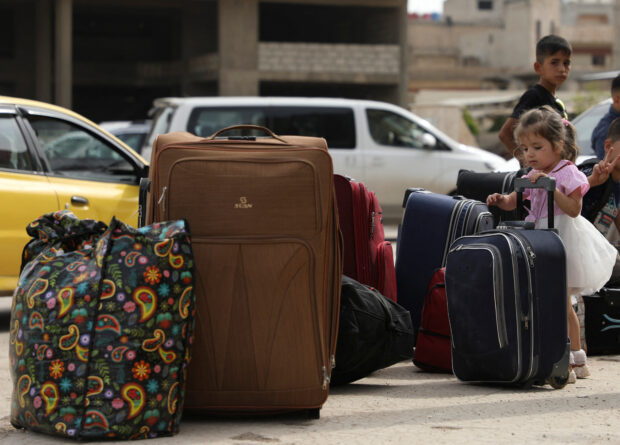Sudan ceasefire starts precariously as continued fighting reported

A Syrian Kurdish girl stands next to belongings after she was evacuated from Sudan, in Kurdish-controlled city of Qamishli, in northern Syria May 22, 2023. REUTERS
KHARTOUM — A week-long ceasefire in Sudan got off to a shaky start on Monday as witnesses in the capital Khartoum reported fighter jets flights over the city and continued fighting in some areas.
Heavy bombardments could be heard in east Khartoum, witnesses said, and one resident shared a picture of thick black smoke rising into the sky. In Omdurman and Bahri, Khartoum’s twin cities, people said they heard sounds of weapons firing.
After five weeks of fierce battles between the army and the paramilitary Rapid Support Forces (RSF), the warring factions on Saturday agreed to a seven-day truce starting at 9:45 p.m. (19:45 GMT) on Monday that was intended to allow for the delivery of aid.
In the hours before the ceasefire went into effect, the army conducted heavy air strikes across the capital Khartoum against its paramilitary rivals.
Although fighting has continued through previous ceasefires, this was the first to be formally agreed following negotiations.
Article continues after this advertisementThe ceasefire deal includes for the first time a monitoring mechanism involving the army and the RSF as well as representatives from Saudi Arabia and the United States, which brokered the agreement after talks in Jeddah.
Article continues after this advertisementShortly before the ceasefire was due to take effect, the RSF released an audio message from its commander Mohamed Hamdan Dagalo, known as Hemedti, in which he thanked Saudi Arabia and the U.S. but urged his men on to victory.
“We will not retreat until we end this coup,” he said.
Both sides accused each other of an attempted power grab at the start of the conflict on April 15.
The ceasefire deal has raised hopes of a pause in a war that has driven nearly 1.1 million people from their homes, including more than 250,000 who have fled into neighboring countries, threatening to destabilize a volatile region.
It should allow civilians to move and give access for humanitarian aid, said Volker Perthes, the U.N. special representative to Sudan.
“This is a welcome development, though the fighting and troop movements have continued even today, despite a commitment of both sides not to pursue military advantage before the ceasefire takes effect,” he told the U.N. Security Council in New York.
RELATED STORIES